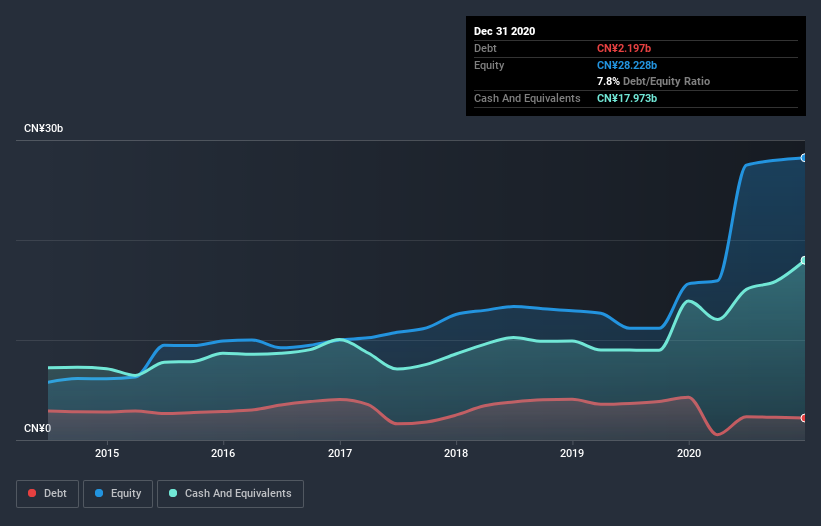
Legendary fund manager Li Lu (who Charlie Munger backed) once said, 'The biggest investment risk is not the volatility of prices, but whether you will suffer a permanent loss of capital.' So it seems the smart money knows that debt - which is usually involved in bankruptcies - is a very important factor, when you assess how risky a company is. We note that Kingsoft Corporation Limited (HKG:3888) does have debt on its balance sheet. But is this debt a concern to shareholders?
When Is Debt A Problem?
Debt assists a business until the business has trouble paying it off, either with new capital or with free cash flow. Ultimately, if the company can't fulfill its legal obligations to repay debt, shareholders could walk away with nothing. However, a more frequent (but still costly) occurrence is where a company must issue shares at bargain-basement prices, permanently diluting shareholders, just to shore up its balance sheet. Of course, the upside of debt is that it often represents cheap capital, especially when it replaces dilution in a company with the ability to reinvest at high rates of return. The first step when considering a company's debt levels is to consider its cash and debt together.
Check out our latest analysis for Kingsoft
What Is Kingsoft's Net Debt?
The image below, which you can click on for greater detail, shows that Kingsoft had debt of CN¥2.20b at the end of December 2020, a reduction from CN¥4.28b over a year. But on the other hand it also has CN¥18.0b in cash, leading to a CN¥15.8b net cash position.

How Strong Is Kingsoft's Balance Sheet?
The latest balance sheet data shows that Kingsoft had liabilities of CN¥3.24b due within a year, and liabilities of CN¥3.57b falling due after that. Offsetting these obligations, it had cash of CN¥18.0b as well as receivables valued at CN¥1.60b due within 12 months. So it can boast CN¥12.8b more liquid assets than total liabilities.
It's good to see that Kingsoft has plenty of liquidity on its balance sheet, suggesting conservative management of liabilities. Because it has plenty of assets, it is unlikely to have trouble with its lenders. Succinctly put, Kingsoft boasts net cash, so it's fair to say it does not have a heavy debt load!
Even more impressive was the fact that Kingsoft grew its EBIT by 101% over twelve months. If maintained that growth will make the debt even more manageable in the years ahead. When analysing debt levels, the balance sheet is the obvious place to start. But it is future earnings, more than anything, that will determine Kingsoft's ability to maintain a healthy balance sheet going forward. So if you're focused on the future you can check out this free report showing analyst profit forecasts.
Finally, a company can only pay off debt with cold hard cash, not accounting profits. Kingsoft may have net cash on the balance sheet, but it is still interesting to look at how well the business converts its earnings before interest and tax (EBIT) to free cash flow, because that will influence both its need for, and its capacity to manage debt. Over the last two years, Kingsoft recorded free cash flow worth a fulsome 83% of its EBIT, which is stronger than we'd usually expect. That puts it in a very strong position to pay down debt.
Summing up
While we empathize with investors who find debt concerning, you should keep in mind that Kingsoft has net cash of CN¥15.8b, as well as more liquid assets than liabilities. And it impressed us with free cash flow of CN¥2.5b, being 83% of its EBIT. The bottom line is that we do not find Kingsoft's debt levels at all concerning. There's no doubt that we learn most about debt from the balance sheet. But ultimately, every company can contain risks that exist outside of the balance sheet. We've identified 1 warning sign with Kingsoft , and understanding them should be part of your investment process.
Of course, if you're the type of investor who prefers buying stocks without the burden of debt, then don't hesitate to discover our exclusive list of net cash growth stocks, today.
If you decide to trade Kingsoft, use the lowest-cost* platform that is rated #1 Overall by Barron’s, Interactive Brokers. Trade stocks, options, futures, forex, bonds and funds on 135 markets, all from a single integrated account. Promoted
Valuation is complex, but we're here to simplify it.
Discover if Kingsoft might be undervalued or overvalued with our detailed analysis, featuring fair value estimates, potential risks, dividends, insider trades, and its financial condition.
Access Free AnalysisThis article by Simply Wall St is general in nature. It does not constitute a recommendation to buy or sell any stock, and does not take account of your objectives, or your financial situation. We aim to bring you long-term focused analysis driven by fundamental data. Note that our analysis may not factor in the latest price-sensitive company announcements or qualitative material. Simply Wall St has no position in any stocks mentioned.
*Interactive Brokers Rated Lowest Cost Broker by StockBrokers.com Annual Online Review 2020
Have feedback on this article? Concerned about the content? Get in touch with us directly. Alternatively, email editorial-team (at) simplywallst.com.
About SEHK:3888
Kingsoft
Engages in the entertainment and office software and services businesses in Mainland China, Hong Kong, and internationally.
Flawless balance sheet with solid track record.

